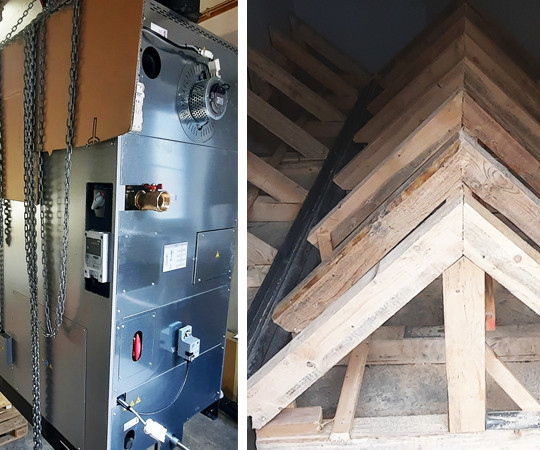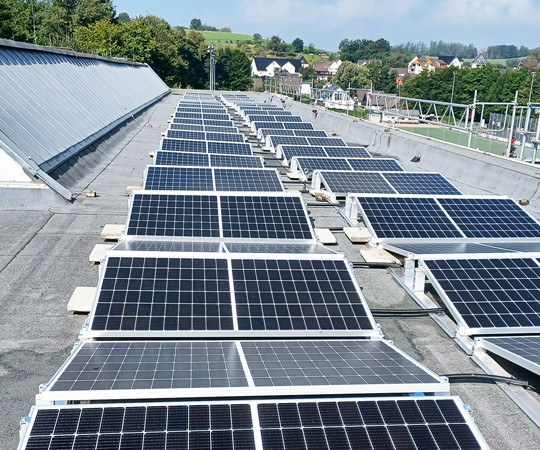
Energy performance contracting: multiple benefits for Gummersbach
The city of Gummersbach can save 786,000 euros a year and avoid 1,200 tons of CO2 emissions thanks to an innovative energy performance contracting. Together with ENGIE Deutschland GmbH, the municipality is focusing on modern technology, sustainability and economic efficiency.
How Gummersbach is setting the course for a sustainable future
In times of rising energy costs and increasing demands for climate protection, many municipalities are faced with the challenge of reducing their energy consumption and operating costs in the long term. The German town of Gummersbach has set itself this task. A total of 17 municipal buildings, including schools, sports halls and building yards, are benefiting from comprehensive modernization measures as part of an energy performance contracting project. ENGIE Deutschland GmbH was commissioned to implement the project.
"After the tender documents were submitted to the city, we drew up a rough analysis and submitted it in February 2023. After various rounds of negotiations, the contract was signed in August of the same year. The detailed analysis confirmed the results of the rough analysis in February 2024, which marked the start of the conversion work," says Michael Effertz, Head of Energy Efficiency West at ENGIE Deutschland, explaining the timeline of the project.
From rough analysis to detailed analysis
Energy performance contracting begins with a comprehensive analysis. First, all relevant data on the existing heating systems, heat distribution, ventilation, lighting and electricity and heat consumption is collected. This information serves as the basis for the rough analysis, which identifies initial savings potential and investment volumes.
"In the detailed analysis, we finally determine the exact savings target as well as the detailed optimization and refurbishment measures with the associated investment and financing costs," explains Effertz. This allows the contractor to check whether the savings forecast calculated in the rough analysis can be confirmed. Additional or alternative measures can also be considered in the detailed analysis in order to further increase the savings potential.
Focus on sustainable technologies
A key aspect of the project is the modernization of the heating systems in eight schools. Fossil fuels are not being used here: Instead, five biomass systems with pellets and three boilers with wood chips provide heat from renewable energy.
Picture: Installation of a pellet boiler and a pellet store at elementary school in Gummersbach as part of an energy performance contracting program
Which fuel is used depends on the conditions on site. "For the comparatively cheaper wood chips, there must be space for tipping, among other things. Pellets, on the other hand, are easier to blow from the truck into the fuel store," says Effertz, describing the criteria for fuel selection.
Picture: Photovoltaic system on the roof of an elementary school in Gummersbach as part of an energy performance contracting project
In addition, photovoltaic systems with a total output of 241 kW are being installed on the roofs of five schools. Three of these systems are equipped with battery storage systems. "The main aim of a storage system is always to maximize the building's own electricity consumption. In addition to the roof area and the output of the photovoltaic system, the electricity demand on site is also decisive," explains Effertz..
Efficiency through intelligent technology
Other measures include the installation of over 1,800 LED lights, the optimization of ventilation technology and the replacement of various pumps. A key component of the project is the installation of a higher-level building management system that integrates an energy management system for around 80 meters.
"The meter evaluation is used to regularly check whether we are within the planned savings or whether we need to take further measures to achieve the targeted savings," says Effertz.
Energy performance contracting: A 10-year plan for success
Implementation of the planned measures began in May 2024, with energy performance contracting scheduled to start in summer 2025. ENGIE guarantees the forecast energy savings for the next ten years and will take over the operation of the biomass boiler systems. This will reduce the organizational and financial burden on the municipality in terms of implementing and supporting such measures.
Investing in the future
A particular advantage of the project lies in the refinancing: the investments in the modernization and refurbishment are covered by the savings in energy and operating costs.
Such projects are becoming increasingly attractive not only for large municipalities, but also for smaller towns. This is because energy performance contracting is a proven model for achieving climate targets and reducing operating costs at the same time. It creates contractual security for successful savings and assumes technical and financial risks.
Energy performance contracting in Gummersbach - a model for other municipalities
The project in Gummersbach impressively demonstrates how sustainable energy solutions and economic efficiency can go hand in hand. The town not only saves on operating costs, but also makes a significant contribution to climate protection.
"With energy performance contracting, the town of Gummersbach can rely on the fact that the predicted energy savings are guaranteed during the contract term of ten years. And thanks to the optimized energy and building technology, the municipality also benefits from long-term economic security and at the same time makes an important contribution to a sustainable and liveable future for its citizens," says Effertz, summarizing the advantages.
Marc Böhnke, Head of Facility Management at the City of Gummersbach, is delighted: "Thanks to the partnership with ENGIE Deutschland, we are coming a step closer to our climate targets and also benefiting economically. The decision to opt for energy performance contracting is therefore a win-win situation for our town in several respects - both now and in the future."
The energy performance contracting model offers a promising solution for municipalities facing similar challenges. The cooperation between Gummersbach and ENGIE Deutschland should therefore also serve as inspiration for other cities and municipalities that want to achieve their climate targets and benefit economically at the same time.
Our Expert












